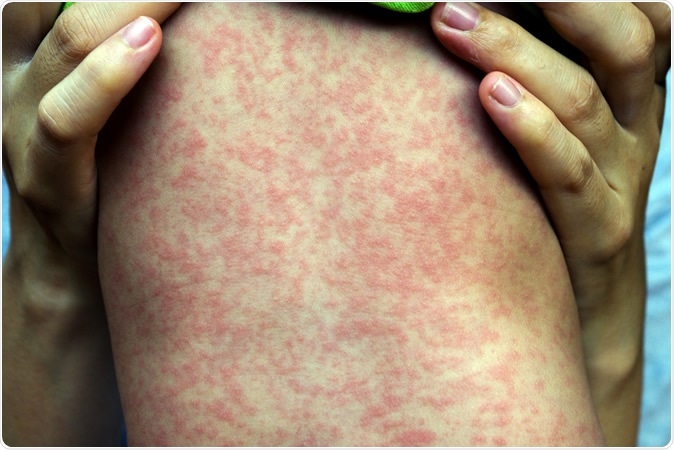Measles is a common childhood illness but can cause more than a passing fever with rash. It could turn out to be a complicated and severe illness, warn doctors in a new paper published in February 2020 in the journal BMJ Case Reports.
Measles
Measles is a very contagious viral illness caused by a respiratory virus. It can cause fever, cough, conjunctivitis, or reddening of the eyes, with a rash found all over the body. It also causes severe immunosuppression in some patients, which results in secondary bacterial infection of the lung, or in viral hepatitis, meningitis, and appendicitis.

Measles rash. Image Credit: Phichet Chaiyabin / Shutterstock
The good thing about measles is that a very effective and safe vaccine can prevent it. However, the acceptance of this vaccine and the related MMR (mumps, measles, and rubella) vaccine has gone down in recent decades because of largely baseless fears that it causes autism in children. Several extensive well-conducted studies have disproved this accusation, but people are still not willing to believe the results. The drop in vaccination rates means a decline in the number of people who receive the measles vaccine and in herd immunity (the population-level immunity that protects unimmunized people from an infection because of the low infection rate in other immunized people around them. As a result, measles has made a significant comeback in many countries around the world, especially in teens and adults.
In 2017, over 110,000 children died of this preventable disease, of whom most were very young. The authors point out, “Large outbreaks with fatalities are currently ongoing in European countries which had previously eliminated or interrupted endemic transmission.” About 10,000 new cases occurred in Europe alone in the period January to June 2019, and most were in adults aged 20-45 years.
The report
The new case report series deals with three people with measles who developed additional complications. For instance, the first was a young man who was only partially immunized against measles, with one dose in childhood instead of two. He developed hepatitis, or liver inflammation, as well.
In the second case, a young woman developed appendicitis in addition to measles. And in the last case report, a middle-aged patient with measles later developed viral meningitis, diagnosed after he reported blurring of vision and a bad headache.
The implications
In all cases, the patients were given proper care and treated with the appropriate tools. All recovered without lasting sequelae.
However, these occurrences are far from unique. In almost 1 of 3 cases, the disease is complicated by another illness, which can involve any organ of the body. This could include pneumonia, seizures caused by high temperatures, and encephalomyelitis, which refers to inflammation of the brain and spinal cord. The patients could have neurological sequelae as a result of these complications.
Another known though rare complication of measles is subacute sclerosing panencephalitis (SSPE), in which the nervous system undergoes progressive damage, finally leaving the affected person to live like a vegetable.
The Centers for Disease Control and Prevention (CDC) report that most complications in measles today occur in children below 5 and adults over 20 years of age, as well as pregnant women and those with weakened immunity. The most common complications requiring intensive care include pneumonia, but post-infectious encephalomyelitis comes a close second.
These complications hit almost every system in the body because the virus is capable of infecting epithelial, reticuloendothelial, and white blood cells, resulting in a severe loss of immunity. In fact, the observed decline in CD4 lymphocytes begins before the rash appears and lasts for as long as one month.
The authors conclude, “Urgent efforts are needed to ensure global coverage with two-dose measles vaccines through education and strengthening of national immunization systems.”
Journal reference:
Xerri T, Darmanin N, Zammit MA, et alComplications of measles: a case series, BMJ Case Reports CP 2020;13:e232408. https://casereports.bmj.com/content/13/2/e232408